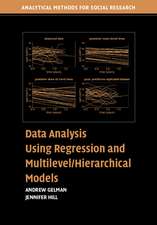A Quantitative Tour of the Social Sciences
Editat de Andrew Gelman, Jeronimo Cortinaen Limba Engleză Paperback – 5 apr 2009
| Toate formatele și edițiile | Preț | Express |
|---|---|---|
| Paperback (1) | 323.05 lei 6-8 săpt. | |
| Cambridge University Press – 5 apr 2009 | 323.05 lei 6-8 săpt. | |
| Hardback (1) | 669.71 lei 6-8 săpt. | |
| Cambridge University Press – 5 apr 2009 | 669.71 lei 6-8 săpt. |
Preț: 323.05 lei
Nou
61.84€ • 67.19$ • 51.98£
Carte tipărită la comandă
Livrare economică 21 aprilie-05 mai
Specificații
ISBN-10: 0521680034
Pagini: 366
Ilustrații: 49 b/w illus. 32 tables 63 exercises
Dimensiuni: 152 x 231 x 23 mm
Greutate: 0.54 kg
Editura: Cambridge University Press
Colecția Cambridge University Press
Locul publicării:New York, United States
Cuprins
1. Models and methods in the social sciences Andrew Gelman; 2. History Herbert Klein and Charles Stockley; 3. Economics Richard Clarida and Marta Noguer; 4. Sociology Seymour Spilerman and Emanuele Gerratana; 5. Political science Charles Cameron; 6. Psychology E. Tory Higgins, Elke Weber, and Heidi Grant; 7. To treat or not to treat: casual inference in the social science Jeronimo Cortina.
Recenzii
'Andrew Gelman and Jeronimo Cortina have put together a unique and important volume covering empirical approaches across the dominant social sciences. Where else would one get detailed advice about specifying, fitting and analyzing quantitative models specifically tailored to five fields written by leaders in those fields? Rather than looking for the lowest-common-factor that relates these areas, the enclosed essays highlight the specialty and diversity of academic social sciences while remaining accessible to students regardless of their individual background. Bracketed by two theoretical discussions, this work provides a stunningly creative approach to broad social science education.' Jeff Gill, Director of the Center for Applied Statistics, Washington University
'A Quantitative Tour of the Social Sciences provides an impressive overview of the uses of statistics throughout the social sciences, from psychology to economics, from sociology to political science. The collection of essays is highly accessible and provides excellent examples of statistical methods in the study of human behavior and society.' Steve Ansolabehere, Professor of Government, Harvard University
Descriere
Social scientists become experts in their own disciplines but aren't always familiar with what is going on in neighboring fields. To foster a deeper understanding of the interconnection of the social sciences, economists should know where historical data come from, sociologists should know how to think like economists, political scientists would benefit from understanding how models are tested in psychology, historians should learn how political processes are studied, psychologists should understand sociological theories, and so forth. This overview by prominent social scientists gives an accessible, non-technical sense of how quantitative research is done in different areas. Readers will find out about models and ways of thinking in economics, history, sociology, political science, and psychology, which in turn they can bring back to their own work.
















